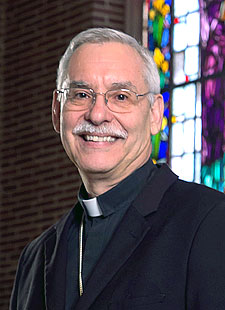Official Website of the
Catholic Diocese of Little Rock
Bishop explains need for eucharistic revival
Published: February 15, 2022
Arkansas Eucharistic Revival Resources
Click on the link above to find resources to help you enkindle a living relationship with Jesus in the Eucharist, which includes information about how the Eucharistic revival will be celebrated in Arkansas.
Bishop Anthony B. Taylor spoke about the upcoming National Eucharistic Revival to Serra Club members in Morris Hall Chapel at St. John Catholic Center in Little Rock on Friday, Feb. 11, 2022.
"One of the chief pastoral problems today is the fact that, according to the 2019 Pew Research Survey, only 31 percent of Catholics believe in the real presence of Jesus in the Eucharist.
"To address this problem, the United States bishops have done two things: 1.) In November, we published a theological document titled: 'The Mystery of the Eucharist in the Life of the Church' to make clear what we believe; and then 2.) we launched a three-year national process of Eucharistic Revival to enkindle in people a living relationship with Jesus in the Eucharist.
 "The theological document provides a summary of the Church’s doctrine on the Eucharist and is intended to be a point of departure to reignite catechesis and evangelization in anticipation of the Eucharistic revival. Its focus is three-fold: kerygma, liturgy and diakonia (or service).
"The theological document provides a summary of the Church’s doctrine on the Eucharist and is intended to be a point of departure to reignite catechesis and evangelization in anticipation of the Eucharistic revival. Its focus is three-fold: kerygma, liturgy and diakonia (or service).
Kerygma — the "lex credendi"
"The first task, which is the foundation for all the rest, is the proclamation of the kerygma: the good news of Jesus’ death and resurrection, Jesus’ self-sacrifice offered at the Last Supper and consummated on Calvary, a proclamation that must flow out of our union with Christ in the Eucharist. The USCCB (U.S. Conference of Catholic Bishops) document emphasizes that the Eucharist is both sacrifice and meal, but the representation of the sacrifice of Christ on the cross — his self-offering to the Father — is primary.
"Moreover, this Eucharistic sacrifice is, for us, intrinsically directed to the inward union of the faithful with Christ through Communion — and therefore, the onus is on each person to discern with a well-formed conscience whether he or she is properly disposed to receive Communion.
"The media gave a great deal of attention to the question of the reception of Communion by pro-choice politicians, but this issue of eucharistic coherence is for everyone. Very few of us are really where we need to be with the Lord, and so preaching on conversion, sin and grace, greater access to the sacrament of reconciliation is an essential foundation for the reception of the kerygma, and thus the Eucharist.
Liturgy — the "lex orandi"
"The hope for Eucharistic renewal depends also on how the liturgy is celebrated. The 'lex orandi' (liturgy) is an expression of the 'lex credendi' (belief) and therefore great attention should be given to the reverence with which the Eucharist is celebrated, and in particular the conscious and active participation of the faithful in the liturgy.
"Everyone, from the priest to the various liturgical ministers and the congregation itself, everyone should examine how he prepares for and participates in the Mass, especially the priest in his exercise of his 'ars celebrandi.' Is his reverence, and that of everyone else, palpable throughout? This includes renewed attention to the role of beauty within the liturgy — in the music, in the artwork, the vestments, the sacred vessels and the architecture. It also includes devotion to the Eucharist outside of Mass: especially Eucharistic adoration.
Diakonia — the "lex vivendi"
"Diakonia (the 'lex vivendi'), how the Eucharist shapes the way we live our daily life. The sacrifice of Christ celebrated in the Eucharist is ultimately about divinization, the transformation of the faithful by self-giving love — and hence the intrinsic link between the celebration of the liturgy and social action.
"Pope Benedict XVI insisted that a Eucharist that does not lead to charitable actions toward one’s neighbor is 'intrinsically fragmented.' The Eucharist draws us into Jesus’ very act of self-giving, such that we give of ourselves in union with Jesus. We offer ourselves in union with Jesus to the Father from the altar during Mass, and having done so, we then proceed to offer ourselves in union with Jesus to the Father in loving service. In this way, the vertical and the horizontal are inseparably linked in 'the breaking of the bread.' Christ invites us to enter into his sacrificial love and then become 'bread that is broken' for others.
"As for the National Eucharistic Revival that the United States bishops have planned for the next three years, the goal is to make everything described in this teaching document a lived reality for all the members of the Church, deepening our understanding of the Eucharist, enriching our worship and energizing our sense of mission 'for the life of the world.'
"The revival begins here in Arkansas with opening Masses at the Cathedral in Little Rock and at St. Vincent de Paul Parish in Rogers the weekend of June 18-19, 2022, the Solemnity of Corpus Christi, the Body and Blood of the Lord. This launches the diocesan phase of the renewal, for which the USCCB is providing us with resources and training.
"This will be a time for the diocese to reflect on how faith formation regarding the Eucharist is going and what changes need to be made in order to enhance the eloquence of our proclamation, the beauty of our worship and the selflessness of our service so that these will truly be at the service of a life-changing encounter with Jesus. Lectures can be planned, outside speakers can be lined up and social media resources will be available.
"In 2023 we will have the parish phase that will seek to bring the fruit of the diocesan phase to bear on the way things are done in our parishes. Study groups would be appropriate and during this phase we will seek to foster Eucharistic adoration in new places and reinforce it where it already exists.
"Then the whole process will culminate in a National Eucharistic Congress in Indianapolis July 17-21, 2024. Its theme is: 'I am the living bread that came down from heaven; whoever eats this bread will live forever; and the bread that I will give is my flesh for the life of the world.' (John 6:51)
"This will be a big event, the first of its kind in almost 50 years! During those five days they hope to form and send forth more than 80,000 Eucharistic missionaries. Virtual participation over the Internet is a possibility for those who can’t make it, but while that’s better than nothing, it is just not quite the same as being there. So, I hope that large groups from Arkansas will participate in this eucharistic congress in person."




